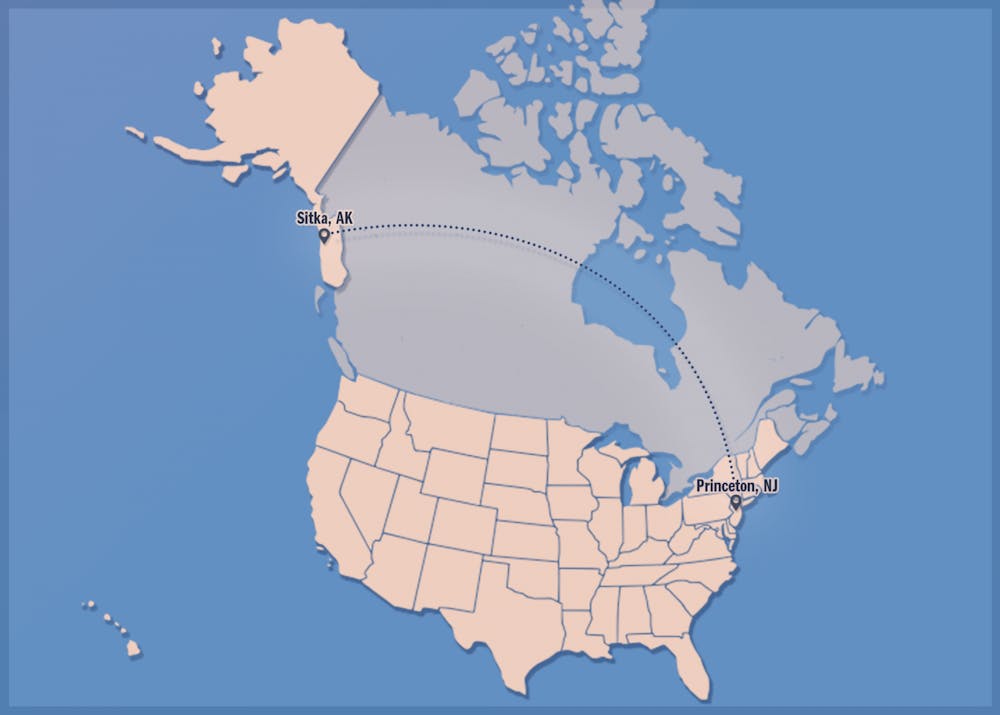Content Warning: The following column references settler colonialism and violence against Alaska Natives and their cultures.
Sitka, Alaska, a tiny, waterfront town situated on the west coast of the Alexander Archipelago, is over 2,800 miles away from Princeton, N.J. Yet despite the distance between them, Sitka and Princeton are inextricably linked through the actions of one man: Sheldon Jackson.
Although often memorialized (in the process of writing this column, I found that most of the sources I consulted celebrated Jackson’s legacy) as the person who brought Western education and Protestantism to Alaska, Jackson was in fact a key agent in the denial, destruction, and appropriation of Alaska Native cultures.
In 1877, Princeton Theological Seminary graduate and Presbyterian missionary Sheldon Jackson arrived in Sitka on his first mission to Alaska. By 1878, he had founded the Sitka Mission, which sought to “assimilate” Alaska Native boys in the vicinity, who were primarily Lingít and Haida. The school, which changed names many times and eventually became the Sheldon Jackson College, was the first American boarding school for Alaska Natives where children were separated from their parents, punished for speaking their native languages, and denied access to their cultures.
In large part due to his efforts, Jackson was appointed the first General Agent of Education in Alaska, a position he held from 1885 to 1907. As General Agent of Education in Alaska, Jackson helped implement a plan to divide Alaska among various Christian religious denominations, so that missionaries representing different Christian faiths would have an assigned area in which to proselytize in the territory. Jackson’s efforts were pivotal in the establishment of American boarding schools for Native children across Alaska.
Although Jackson was not a Princetonian himself, his legacy is deeply tied to the University. During his time in Alaska, Jackson collected nearly 5,000 items belonging to Alaska Natives across the peninsula. While the majority of these items are housed at the Sheldon Jackson Museum in Sitka, Jackson also sent Alaska Native goods (in addition to Native goods from Washington and Arizona) to the Princeton Theological Seminary. These goods eventually were transferred to the Trustees of what was then Princeton College. Today, they are ‘owned’ by the University’s Department of Geosciences and are currently on loan to the Princeton University Art Museum. The majority of the material acquired by the University through Sheldon Jackson remains unknown or unidentified in its origin.
I, like many Princetonians, was unaware of the connection between Sitka and Princeton until this May, when I had the opportunity to visit Alaska through a trip sponsored by Princeton’s Program in Russian, East European and Eurasian Studies.
Before arriving in Alaska, I was prepared to confront Russia’s colonial legacy there. After all, one of the key objectives of the trip was to help students reach a deeper understanding about the history and lingering influence of the Russian Empire’s colonization of Alaska, whose 100-odd year stint as a Russian territory often goes overlooked. I did not, however, expect to find that Princeton — the municipality and University alike — remains connected to American colonization of the Alaskan peninsula.
As members of the Princeton community, it is time we collectively acknowledge that Sheldon Jackson’s legacy is tied to our university and that the Department of Geosciences holds objects he ‘collected.’ To do so would mark a key step in scrutinizing the University’s connection to the systemic racism and settler colonialism that characterizes the past and the present of the United States. As for the items held by the Department of Geosciences, whether they should be returned to the descendants of those who made them or kept in scholastic institutions is not for me to say: only the people to whom they rightfully belong can speak on what their future should hold.
Genrietta Churbanova is a junior from Little Rock, Ark in the Anthropology Department. She is Head Opinion Editor. Genrietta can be reached at geaac@princeton.edu.









